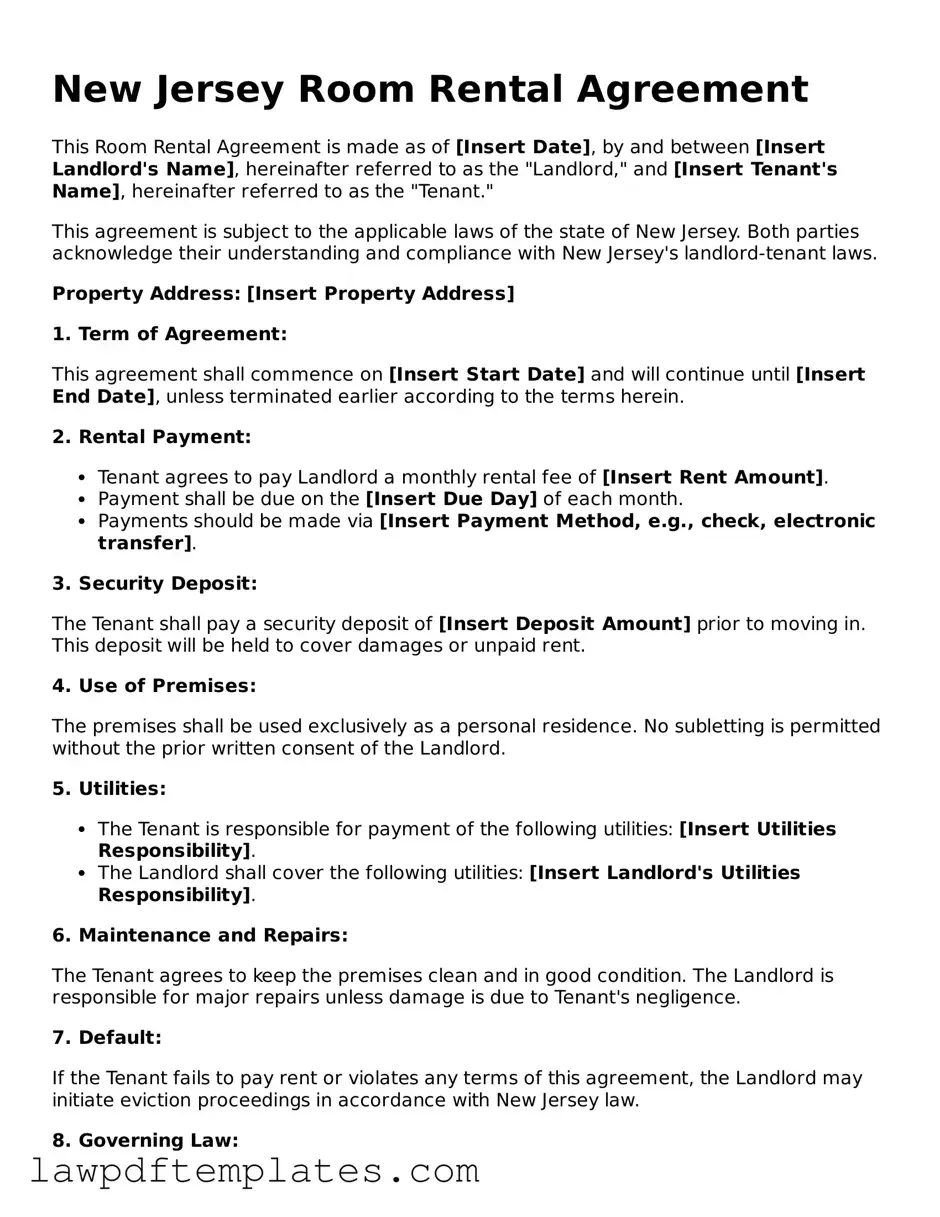Free Room Rental Agreement Template for the State of New Jersey
Form Breakdown
| Fact Name | Description |
|---|---|
| Purpose | The New Jersey Room Rental Agreement form is designed to outline the terms and conditions under which a room is rented, protecting both the landlord and tenant. |
| Governing Law | This agreement is governed by the New Jersey Statutes, specifically Title 46, which addresses property and landlord-tenant relationships. |
| Parties Involved | The form requires identification of both the landlord and the tenant, ensuring clarity about who is entering into the agreement. |
| Rental Amount | The rental amount must be clearly stated, including details about payment frequency, such as monthly or weekly payments. |
| Security Deposit | The agreement should specify if a security deposit is required, along with the amount and conditions for its return. |
| Duration of Agreement | The length of the rental period must be defined, whether it is a fixed term or month-to-month arrangement. |
| Termination Conditions | It is essential to outline the conditions under which either party may terminate the agreement, including notice periods. |
| Maintenance Responsibilities | The form should clarify the responsibilities of both the landlord and tenant regarding maintenance and repairs of the rental property. |
Sample - New Jersey Room Rental Agreement Form
New Jersey Room Rental Agreement
This Room Rental Agreement is made as of [Insert Date], by and between [Insert Landlord's Name], hereinafter referred to as the "Landlord," and [Insert Tenant's Name], hereinafter referred to as the "Tenant."
This agreement is subject to the applicable laws of the state of New Jersey. Both parties acknowledge their understanding and compliance with New Jersey's landlord-tenant laws.
Property Address: [Insert Property Address]
1. Term of Agreement:
This agreement shall commence on [Insert Start Date] and will continue until [Insert End Date], unless terminated earlier according to the terms herein.
2. Rental Payment:
- Tenant agrees to pay Landlord a monthly rental fee of [Insert Rent Amount].
- Payment shall be due on the [Insert Due Day] of each month.
- Payments should be made via [Insert Payment Method, e.g., check, electronic transfer].
3. Security Deposit:
The Tenant shall pay a security deposit of [Insert Deposit Amount] prior to moving in. This deposit will be held to cover damages or unpaid rent.
4. Use of Premises:
The premises shall be used exclusively as a personal residence. No subletting is permitted without the prior written consent of the Landlord.
5. Utilities:
- The Tenant is responsible for payment of the following utilities: [Insert Utilities Responsibility].
- The Landlord shall cover the following utilities: [Insert Landlord's Utilities Responsibility].
6. Maintenance and Repairs:
The Tenant agrees to keep the premises clean and in good condition. The Landlord is responsible for major repairs unless damage is due to Tenant's negligence.
7. Default:
If the Tenant fails to pay rent or violates any terms of this agreement, the Landlord may initiate eviction proceedings in accordance with New Jersey law.
8. Governing Law:
This agreement shall be governed by the laws of the State of New Jersey.
9. Signatures:
By signing below, both parties agree to the terms and conditions of this Room Rental Agreement.
Landlord Signature: ________________________ Date: _______________
Tenant Signature: ________________________ Date: _______________
Common mistakes
Filling out the New Jersey Room Rental Agreement form requires attention to detail. One common mistake is failing to include all required personal information. Renters often overlook sections that ask for their full name, current address, and contact information. Incomplete information can lead to delays or disputes down the line.
Another frequent error is neglecting to specify the rental period. Many individuals assume that the duration of the agreement is understood. However, it is crucial to clearly state the start and end dates of the rental period to avoid confusion later.
Some people mistakenly leave out the rental amount. This detail is vital, as it sets clear expectations for both parties. Without a specified rent amount, misunderstandings can arise regarding payment obligations.
Additionally, renters sometimes forget to include the security deposit amount. A security deposit serves as protection for the landlord against potential damages or unpaid rent. Clearly stating this amount in the agreement helps prevent disputes over what is owed at the beginning of the rental period.
Another common oversight is failing to outline the rules and responsibilities of both parties. This can include house rules, maintenance obligations, and payment deadlines. A well-defined agreement helps ensure that both the landlord and tenant understand their rights and responsibilities.
People also often neglect to sign and date the agreement. An unsigned document may not hold up in court if a dispute arises. Both parties should ensure they sign and date the agreement to confirm their acceptance of the terms.
Finally, overlooking the need for witnesses or notarization can be a significant mistake. While not always required, having a witness or notary can add an extra layer of legitimacy to the agreement. This can be especially important in case of future legal issues.
Discover More Room Rental Agreement Templates for Specific States
Room Rental Agreement Template - Informs about insurance requirements, if applicable.
Renting a Room Lease Agreement - Reiterates the importance of communication to foster a positive renting experience.
The simple trailer bill of sale requirements help ensure all necessary information is captured during the sale process, providing security and clarity for both buyers and sellers.
Lease Agreement for Roommate - Provides space for additional provisions specific to the rental situation.
Room Rental Lease Agreement - Provides details on pet policies within the rental agreement.
